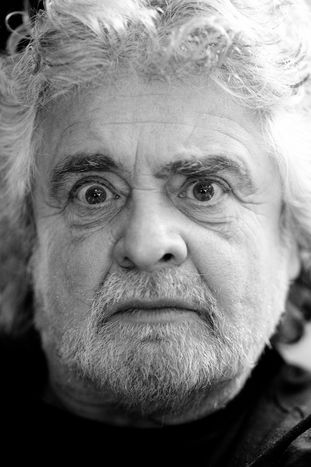
Beppe Grillo: ‘Italy is as little a country now as it was 150 years ago’
Published on
Giuseppe Piero Grillo, 62, is a national celebrity, blogger and comedian. The married father-of-six is probably the least likely of all 60 million Italians to party over Italy's 150th anniversary in 2011. After falling in disgrace with Italy's powerful media conglomerates, he was banned from national television in the mid-1980s.
He now blogs and performs his comedy shows live across the country, and speaks exclusively to Bruno van den Elshout for cafebabel.com
‘Blogging allows me to spread ideas that the traditional media refuse to cover, like the fact that our parliament counts no less than twenty-five convicted criminals. The infrastructure of the web has helped me create my very own media platform, independent of mass media. Out through the door, back in through the window is my story with Italian media. I don't have any stakes or prestige to protect. Many other Italians do, especially when they are esteemed to be influential. They constantly need to cover their backs, while all I do is being sincere in my curiosity, thinking about what I see and telling people about that. From an Italian perspective, that's a revolutionary approach to reality. Within Europe Italy is one of the few countries where the simple habit of consistently being honest is sufficient to become a celebrity. Sincerity in Italy is like a miracle.
'Sincerity in Italy is like a miracle'
My early career had little to do with politics. I organised small gigs, playing the guitar, singing songs and telling jokes. I quit economics at university to dedicate my time to travelling and performing. Like an Italian version of Jacques Brel, slowly evolving into a full-grown comedian, then TV host. I only regained interest in economics in the 1980s. I was featured in a commercial campaign for a famous brand of yoghurt, and started thinking: what did it actually take to turn milk into a ready-to-eat product? I traced down the different logistical phases between the cow and my kitchen fridge, realising that it had taken 7, 000 kilometers of travelling in-between. I was shocked at what seemed like unforgivable inefficiency, only then to find out that almost every single part of our daily reality is made up out of such useless waste of value. Columbus, a Genovese, already did better in the fifteenth century, bringing home tomato seeds instead of the actual tomatoes - which is what would happen today. Possession nowadays seems to prevail over opportunities: it's the world upside down.
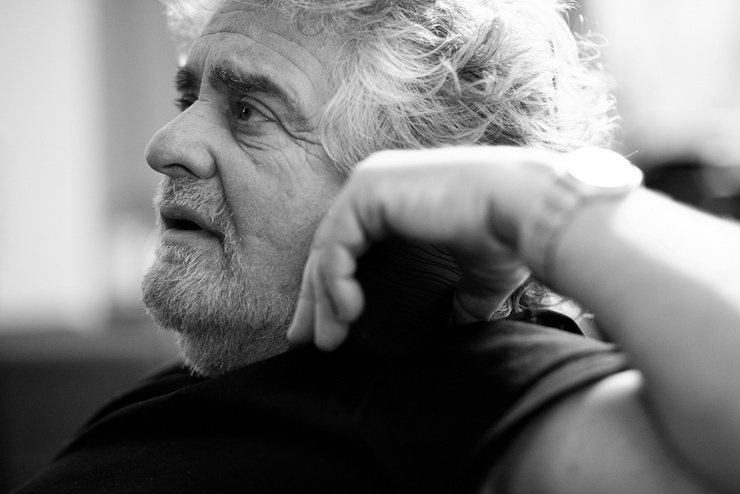
There's nothing to celebrate. Italy is an arbitrary collection of geographic regions. It's as little a country now, as is was 150 years ago. It has fallen asleep. As if the entire country is on a bad trip, the majority of Italians spend their time fearing enemies who never show up. In the meantime, they forget to think about the problems they're facing today. We are known as passionate and emotional, but we use our energy to fight the wrong battles. Our attention span has been reduced to merely five minutes, which is greatly insufficient to work on structural improvements. Our population is too old and if that's not enough: we're bankrupt. We're like Wile E. Coyote who just ran into a ravine. He keeps on running and only falls after he looks down and realises that he's hanging in the air. Wile E. Coyote is us, and we refuse to look down.
'The majority of Italians spend their time fearing enemies who never show up'
The political system has been made so incredibly complex that nobody can even have a grasp of what is going on. It's kept that way because the more complex it gets, the more money it generates for the actors involved. Or wastes it - from a citizen's point of view. In many ways, the EU and Italy are in similar positions. The Italian nation state survives because its political system is so complicated that people give up caring about it. The EU relies on the exact same principle: once conceived by visionary intellectuals, the storylines of Italian and European history have been reduced to a framework of short-term financial benefits for a small group of people. The Italian political arena is a bottomless pool of conflicting interests. Presidents of the local councils are commissioners with banks, they own a couple of companies themselves and if they're Really Important Italians, they also have a TV channel or two and a portfolio of real estate property. As a result, all of Italian society is intermingled. Even the mafia has been corrupted by the infiltration of government officials, just as much as the reverse: mafia corrupting authorities.
Politicians use words to gradually turn the world into a cash cow that serves their personal interests, like the issue of drinking water. Politicians proudly declare: 'No, we are not going to privatise water supply. We just aim to select the best suitable commercial partner for the distribution part of the supply chain.' But that's all bullshit. They just patch their doubtful initiatives with comforting words. If we don't do anything about it, water supply in Italy is going to be a commercial project, basta.
Despite the poor situation Italy's in, we've got a history full of remarkable milestones. Fascism was invented in Italy. Banks in their current form were invented in Genoa, just like insurances, logistic science, marine navigation. The three biggest mafia organisations in the world are Italian. We had cars before the Americans, electrical cars before the Japanese. Italian ideas spread like viruses: the good ideas just as much as the bad ones.
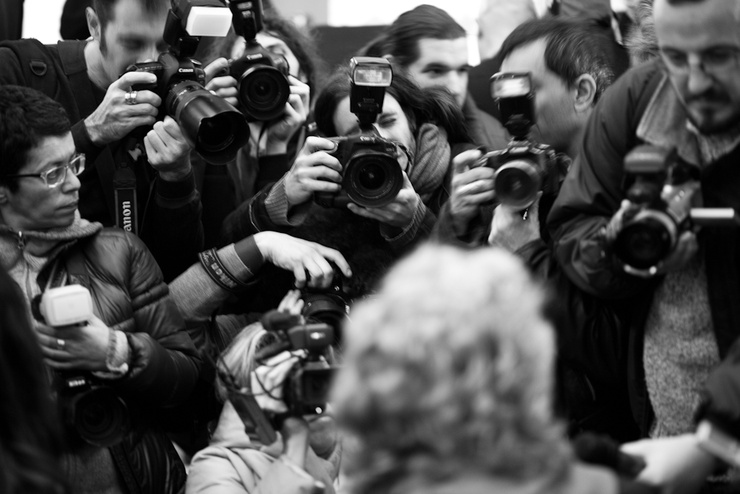
Whether I'm personally proud to be Italian, depends. For now, I have no urge to live anywhere but in Italy. People know me. They hug me, pat me on the back, talk to me. My audience serves as my protection against people with political or economical ideas that are different from mine. I hardly ever pay need to pay any bills; a taxi driver will offer me a ride, a restaurant owner or most hotel managers will invite me. In Italy, people like to think of celebrities as their personal friends. Who am I not to gracefully accept such hospitality? I wouldn't if I were a politician, but I'm not. I don't owe anything to anybody. I have no accounts to settle. Every self-respecting Italian nowadays receives a bullet by the mail every now and then. I sent myself one, because nobody else did it for me...
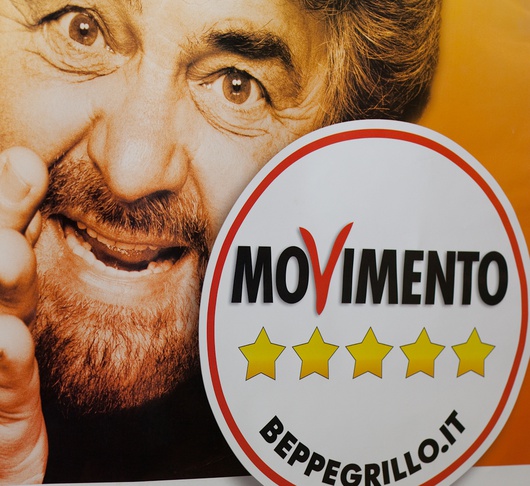 The one thing I definitely take pride in is to see a growing countermovement of young Italians who are fed up with the ridiculous complexity of Italian politics. Who see that we're heading for disaster if things stay the way they are. I am proud of the creation of the Five Star Movement, a tremendously popular network of young, ambitious Italians united in local branches across the country. Although they have regular meetings and give rise to the creation of new political parties, the movement itself is not a political party. I'm not their political leader. I am just nourishing their ambitions, serving as their loudspeaker into the world, providing a stage for their voice to get heard. Inspire them to make Italy a better country for the 150 years to come.’
The one thing I definitely take pride in is to see a growing countermovement of young Italians who are fed up with the ridiculous complexity of Italian politics. Who see that we're heading for disaster if things stay the way they are. I am proud of the creation of the Five Star Movement, a tremendously popular network of young, ambitious Italians united in local branches across the country. Although they have regular meetings and give rise to the creation of new political parties, the movement itself is not a political party. I'm not their political leader. I am just nourishing their ambitions, serving as their loudspeaker into the world, providing a stage for their voice to get heard. Inspire them to make Italy a better country for the 150 years to come.’
Beppegrillo.it was launched in 2005 and reaches thousands of Italians every day - it is also published in English and Japanese
Vox-pop: three Italians on Beppe Grillo
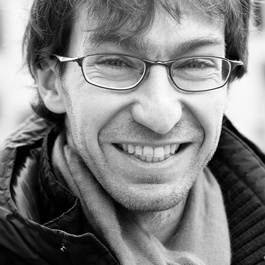 ‘Beppe Grillo was one of the first to write about who and why our political system doesn't make sense. He publishes blog articles with the names of members of parliament who have been convicted - not suspected but convicted - for crimes, but who nevertheless manage to keep their seats in parliament because they cover up for somebody else, who covers up, etc. A couple of years ago, he collected four times the number of signatures needed to hold a 'Clean up politics' referendum about kicking convicts out of parliament, limiting political careers to two terms, and direct voting for candidates. The referendum never took place. But no matter how small his political power is or will become, his commitment to telling us the truth about our country, predicting and uncovering scandals, is desperately needed. We can't expect any of today's political leaders to do this work in his place, no matter how sad that may sound’
‘Beppe Grillo was one of the first to write about who and why our political system doesn't make sense. He publishes blog articles with the names of members of parliament who have been convicted - not suspected but convicted - for crimes, but who nevertheless manage to keep their seats in parliament because they cover up for somebody else, who covers up, etc. A couple of years ago, he collected four times the number of signatures needed to hold a 'Clean up politics' referendum about kicking convicts out of parliament, limiting political careers to two terms, and direct voting for candidates. The referendum never took place. But no matter how small his political power is or will become, his commitment to telling us the truth about our country, predicting and uncovering scandals, is desperately needed. We can't expect any of today's political leaders to do this work in his place, no matter how sad that may sound’
Alessandro, 34
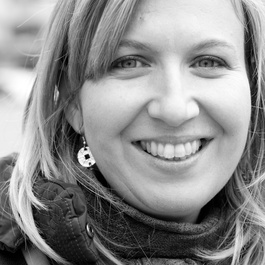 ‘The political system in this country is rotten and an entire generation is suffering. Italians who are now between 25 and 40 years old are called bamboccioni - big babies - because many of us are jobless and, if it weren't for our parents support, homeless. I have studied to be a teacher, but since I graduated, laws have changed so that in order to be even allowed to teach, I need to re-attend university for another two years. Today's language teachers don't even have to sit exams in the language they teach. The education system is preparing us for another lost generation behind us, all because personal interests of politicians keep them from making decisions in the interest of the people. I won't vote for Beppe Grillo's movement because I find his ideas too extreme. But he is definitely right in claiming that our country should change’
‘The political system in this country is rotten and an entire generation is suffering. Italians who are now between 25 and 40 years old are called bamboccioni - big babies - because many of us are jobless and, if it weren't for our parents support, homeless. I have studied to be a teacher, but since I graduated, laws have changed so that in order to be even allowed to teach, I need to re-attend university for another two years. Today's language teachers don't even have to sit exams in the language they teach. The education system is preparing us for another lost generation behind us, all because personal interests of politicians keep them from making decisions in the interest of the people. I won't vote for Beppe Grillo's movement because I find his ideas too extreme. But he is definitely right in claiming that our country should change’
Simona, 37
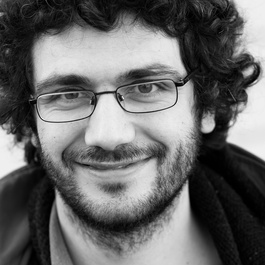 ‘Internet is the only access to information about what's actually going on in Italy. Young people don't read newspapers because they know they can't trust them. Many of them do trust what they hear on TV, and if you switch it on, it will tell you that Berlusconi is doing great things. But guess who's the owner of the TV channel? Berlusconi. Few people Italians are willing to think ahead of what they hear and see. The same goes for Beppe Grillo. His ideas are popular, but many of the people who adopt them, are unable to think for themselves. They copy and paste. That makes the entire movement a bit scary. How long will it take before power structures will prevail over good ideas. Berlusconi is not Italy's major problem. We ourselves are the problem. We are a country of eternal adolescents. We want to possess beautiful things, the more the better. We compare. We want more than the other. And we need a boss to restrain us, almost like a parent and somebody to continuously disagree with. We need bosses, we make bosses so we will have bosses. And it's hard to blame them for also wanting to possess beautiful things, even if it's at other people's expense’
‘Internet is the only access to information about what's actually going on in Italy. Young people don't read newspapers because they know they can't trust them. Many of them do trust what they hear on TV, and if you switch it on, it will tell you that Berlusconi is doing great things. But guess who's the owner of the TV channel? Berlusconi. Few people Italians are willing to think ahead of what they hear and see. The same goes for Beppe Grillo. His ideas are popular, but many of the people who adopt them, are unable to think for themselves. They copy and paste. That makes the entire movement a bit scary. How long will it take before power structures will prevail over good ideas. Berlusconi is not Italy's major problem. We ourselves are the problem. We are a country of eternal adolescents. We want to possess beautiful things, the more the better. We compare. We want more than the other. And we need a boss to restrain us, almost like a parent and somebody to continuously disagree with. We need bosses, we make bosses so we will have bosses. And it's hard to blame them for also wanting to possess beautiful things, even if it's at other people's expense’
Isaia, 29
All images: © PHOTOLOGIX.NL/ Bruno van den Elshout



